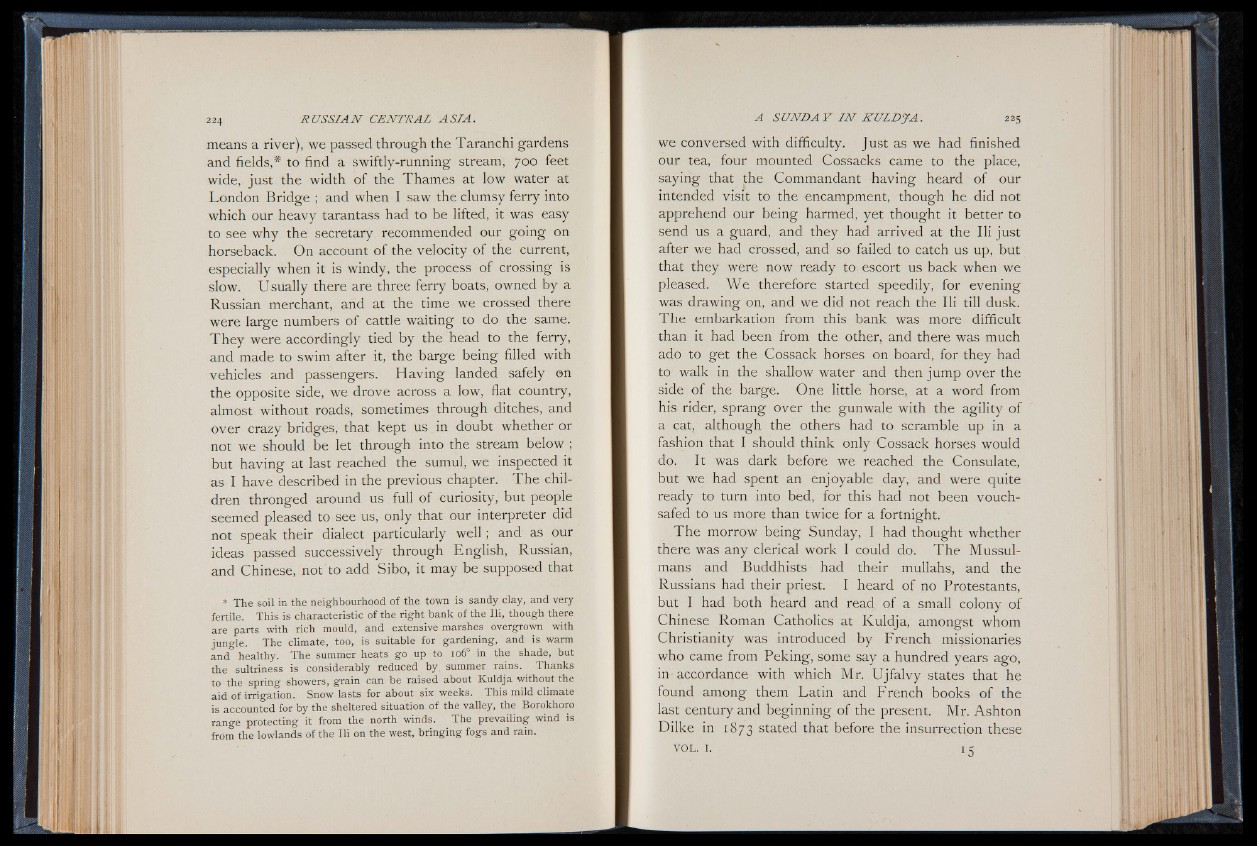
means a river), we passed through the Taranchi gardens
and fields,* to find a swiftly-running stream, 700 feet
wide, just the width of the Thames at low water at
London Bridge ; and when I saw the clumsy ferry into
which our heavy tarantass had to be lifted, it was easy
to see why the secretary recommended our going on
horseback. On account of the velocity of the current,
especially when it is windy, the process of crossing is
slow. Usually there are three ferry boats, owned by a
Russian merchant, and at the time we crossed there
were large numbers of cattle waiting to do the same.
They were accordingly tied by the head to the ferry,
and made to swim after it, the barge being filled with
vehicles and passengers. Having landed safely on
the opposite side, we drove across a low, flat country,
almost without roads, sometimes through ditches, and
over crazy bridges, that kept us in doubt whether or
not we should be let through into the stream below ;
but having at last reached the sumul, we inspected it
as I have described in the previous chapter. The children
thronged around us full of curiosity, but people
seemed pleased to see us, only that our interpreter did
not speak their dialect particularly w e ll; and as our
ideas passed successively through English, Russian,
and Chinese, not to add Sibo, it may be supposed that
* The soil ik the neighbourhood of the town is sandy clay, and very
fertile. This is characteristic of the right bank of the Hi, though there
are parts with rich mould, and extensive marshes overgrown with
jungle. The climate, too, is suitable for gardening, and is warm
and healthy. The summer heats go up to 106° in the shade, but
the sultriness is considerably reduced by. summer rains. Thanks
to the spring showers, grain can be raised about Kuldja without the
aid of irrigation. Snow lasts for about six weeks. This mild climate
is accounted for by the sheltered situation of the valley, the Borokhoro
range protecting it from the north winds. The prevailing wind is
from the lowlands of the Ili on the west, bringing fogs and rain.
we conversed with difficulty. Just as we had finished
our tea, four mounted Cossacks came to the place,
saying that the Commandant having heard of our
intended visit to the encampment, though he did not
apprehend our being harmed, yet thought it better to
send us a guard, and they had arrived at the Ili just
after we had crossed, and so failed to catch us up, but
that they were now ready to escort us back when we
pleased. We therefore started speedily, for evening
was drawing on, and we did not reach the Ili till dusk.
The embarkation from this bank was more difficult
than it had been from the other, and there was much
ado to get the Cossack horses on board, for they had
to walk in the shallow water and then jump over the
side of the barge. One little horse, at a word from
his rider, sprang over the gunwale with the agility of
a cat, although the others had to scramble up in a
fashion that I should think only Cossack horses would
do. It was dark before we reached the Consulate,
but we had spent an enjoyable day, and were quite
ready to turn into bed, for this had not been vouchsafed
to us more than twice for a fortnight.
The morrow being Sunday, I had thought whether
there was any clerical work I could do. The Mussulmans
and Buddhists had their mullahs, and the
Russians had their priest. I heard of no Protestants,
but I had both heard and read of a small colony of
Chinese Roman Catholics at Kuldja, amongst whom
Christianity was introduced by French missionaries
who came from Peking, some say a hundred years ago,
in accordance with which Mr. Ujfalvy states that he
found among them Latin and French books of the
last century and beginning of the present. Mr. Ashton
Dilke in 1873 stated that before the insurrection these
v o l . 1. 1 5